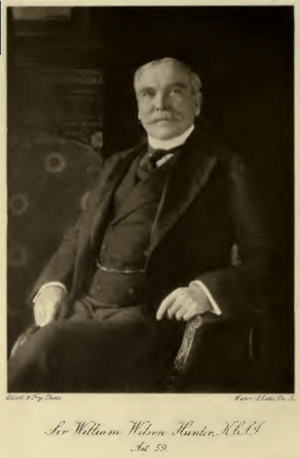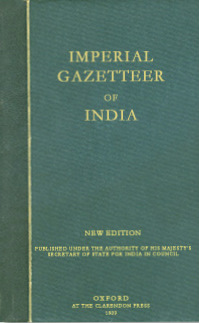William Wilson Hunter facts for kids
Quick facts for kids
Sir William Wilson Hunter
|
|
|---|---|
 |
|
| Born | 15 July 1840 |
| Died | 6 February 1900 (aged 59) Oaken Holt, England, UK
|
| Nationality | British |
| Alma mater | University of Glasgow |
| Scientific career | |
| Fields | History, statistics |
| Institutions | Indian Civil Service University of Calcutta |
Sir William Wilson Hunter (born July 15, 1840 – died February 6, 1900) was an important Scottish historian and statistician. He was also a member of the Indian Civil Service, which was the government administration in India when it was part of the British Empire.
He is best known for creating The Imperial Gazetteer of India. This was a huge collection of information about India. He started working on it in 1869. It was first published in nine volumes in 1881. After his death, it grew to twenty-six volumes.
Contents
Early Life and Education
William Wilson Hunter was born in Glasgow, Scotland, on July 15, 1840. His father, Andrew Galloway Hunter, was a manufacturer in Glasgow. William was the second of three sons.
In 1854, he began his schooling at a place called 'Quaker Seminary' in Hampshire. A year later, he went to The Glasgow Academy. He studied at the University of Glasgow, where he earned his Bachelor of Arts degree in 1860. He also studied in Paris and Bonn. During this time, he learned Sanskrit, an ancient Indian language. In 1862, he passed the exam for the Indian Civil Service with the highest score.
Career in India
Hunter arrived in Bengal Presidency in November 1862. He became an assistant magistrate and collector in Birbhum. This is where he started gathering local stories and records. These notes became the basis for his book, The Annals of Rural Bengal. This book even inspired some historical novels by Bankim Chandra Chattopadhyay.
He also put together A Comparative Dictionary of the Non-Aryan Languages of India. This was a list of different dialects. It showed how hard he worked, even if some of his language ideas were still new.
The Imperial Gazetteer of India
In 1869, Lord Mayo, who was the governor-general at the time, asked Hunter for a plan. Lord Mayo wanted a full statistical survey of India. This project meant bringing together many local reports. Hunter wanted his work to be a lasting record of Britain's efforts in India. He hoped it would be more complete than earlier surveys.
Hunter also wrote an important book called The Indian Musalmans in 1871. In this book, he looked into whether Indian Muslims were required by their religion to rebel against the British Queen. He found that most Muslim scholars believed there was no need for a religious war. This was because Muslims in British India had protection and freedom.
In 1872, Hunter published his history of Orissa. He also wrote about health issues. He noted how large religious gatherings could spread diseases like cholera. He described how pilgrims could carry infection, which might then spread to other parts of the world.
Hunter traveled all over India for his work. He oversaw the creation of A Statistical Account of Bengal. This was a huge project with 20 volumes published between 1875 and 1877. He also did a similar work for Assam (2 volumes, 1879).
He explained that all the information for British India had been collected. This included data from the first Census of India. This massive collection of facts covered a continent with more people than all of Europe, except Russia.
The statistical accounts covered 240 administrative districts. These were condensed into the nine volumes of The Imperial Gazetteer of India, published in 1881. The Gazetteer was updated later. The second edition had 14 volumes (1885-1887). The third edition, published in 1908, had 26 volumes and included an atlas.
Hunter also created a way to write Indian place-names in English. This helped people pronounce them correctly. His own article on India became a book in 1880, called A Brief History of the Indian Peoples. This book was widely used in Indian schools. A new version came out in 1895, titled The Indian Empire: its People, History and Products.
Hunter believed that "Nothing is more costly than ignorance." He hoped his work would help people understand India better. He wanted it to fight against old prejudices and lead to more accurate knowledge of the country. His main goal was to help India be governed better because it was better understood.
Hunter also wrote articles for the 9th edition of the Encyclopædia Britannica. These included articles on "Bombay," "Calcutta," "Dacca," "Delhi," and "Mysore."
Later Career and Retirement
In 1882, Hunter was part of the governor-general's council. He led the Commission on Indian Education. In 1886, he was chosen as the vice-chancellor of the University of Calcutta.
He retired from his service in 1887. He was given the title KCSI and moved to Oaken Holt, near Oxford, England. He was also on the governing body of Abingdon School from 1895 until his death.
In 1889, Hunter helped create a series of books called Rulers of India. This series told the stories of important British leaders and administrators in India. Hunter himself wrote the volumes about Dalhousie (1890) and Mayo (1891) for this series.
He had also written an official book about the life of Lord Mayo, published in 1875. Hunter also wrote a weekly article about Indian affairs for The Times newspaper. He started working on a large history of British Dominion in India. However, he only finished two volumes before he died. These volumes only covered up to the year 1700. He also organized and published some of his notes in 1894 as Bengal Manuscript Records.
Hunter dedicated his 1892 book, Bombay 1885 to 1890: A Study in Indian Administration, to Florence Nightingale.
His later works include a novel called The Old Missionary (1895) and The Thackerays in India (1897). The Old Missionary is considered an important work by British writers in India about missionaries.
In the winter of 1898–1899, Hunter became very sick with influenza. This illness affected his heart. He passed away at Oaken Holt on February 6, 1900.
See also
- The Imperial Gazetteer of India
- Hunterian transliteration
- Census of India prior to independence
 | Selma Burke |
 | Pauline Powell Burns |
 | Frederick J. Brown |
 | Robert Blackburn |


